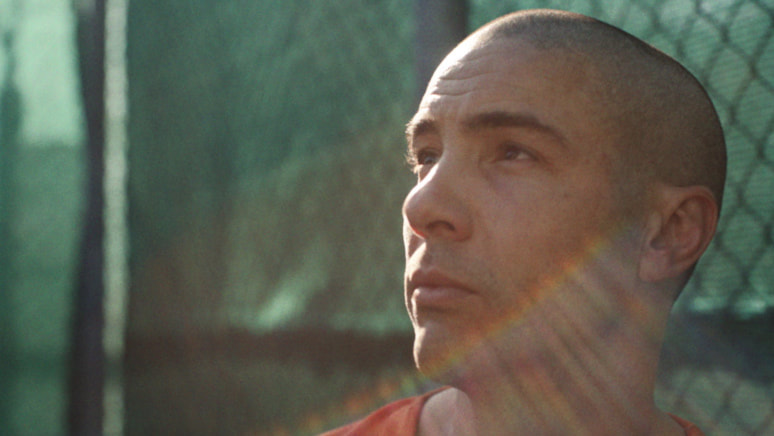|
Tahar Rahim in The Mauritanian (2021) Based on the best-selling memoir Guantánamo Diary, The Mauritanian tells the devastating true story of Mohamedou Ould Slahi. During a horrific chapter of his life, he was detained without charges at the US military’s Guantánamo Bay detention center. Director Kevin Macdonald brings forth his experience as a documentarian to portray what Guantánamo looked like to Mohamedou. The US government spent millions of dollars keeping the realities of this center a secret. For those who have not heard Mohamedou’s story, the film tells terrifying truths that play out with a mystery/thriller structure which then morphs into greater focus on Mohamedou himself. Echoing at the heart of The Mauritanian is Tahar Rahim’s absolutely phenomenal performance as a man forced to endure such harrowing psychological and physical mistreatment.
The direction and screenplay go for a balancing act, interweaving Mohamedou’s experiences and memories with the exposé that unravels after his situation gets more attention. The key players involved in his case include his defense attorney Nancy Hollander (Jodie Foster) fighting for his release and prosecutor Stuart Couch (Benedict Cumberbatch) on a crusade against him. Mohamedou puts his trust into Nancy the moment he signs on the dotted line in acceptance of her defense, and the two share some emotionally intense scenes that rightfully question the legitimacy of the corrupt legal system that would decide his fate. With the depictions of characters surrounding Mohamedou, The Mauritanian looks through the lens of America’s relationship to him. The film broadens his story to portray the contrasting attitudes working for and against his rights. Several scenes show characters operating on the right and wrong side of history, sparring with words in the fight towards different meanings of justice. During one of very few scenes between Nancy and Stuart in particular, they share a conversation after which she realizes she needs to change the narrative. People need to hear Mohamedou's story directly from him. The mystery/thriller trope that questions whether he is guilty or innocent morphs into a character study that uncovers the brutality of how he was treated in prison. Through Mohamedou's written testimony, the film depicts his trauma which includes some moments that are horrific to watch on screen. The film is a powerful depiction of the terrifying embedded realities hidden away at a place that was built outside of court reach. The decision to balance an intense character study with so many other moving parts is not one that pays off. When operating as a character study, The Mauritanian resonates. The story follows Mohamedou from the moment he is detained to the rulings on his case, while also intertwining some of his childhood memories in Mauritania. “You are our hope,” a family member once told him after learning he received a scholarship to study in Germany. The film provides glimpses into his life outside of prison, further stressing the time he lost and the relationships he missed. The majority of Mohamedou’s story is told during his imprisonment, which depicts not only the mistreatment he’s forced to endure but also the love and humanity that exists within him. The role is played by one of the most gifted actors of his generation, Tahar Rahim, who gives a spirited performance that works absolute wonders for the film. In the face of fear and terror he brings moments of warmth and energy, a work of humanity that is heartbreaking to watch. When operating as a thriller and courtroom drama, The Mauritanian stumbles through questionable dialogue and distracting roles. The film shows the legal side to Mohamedou’s case by introducing defense and prosecution characters. While it’s somewhat understandable to incorporate Stuart Couch in exploration of such blatant corruption and a haunted conscience, not only is the role itself by far the least interesting but it’s also poorly written. To worsen matters, Cumberbatch and his sour accent go in the opposite direction of elevating the material. Another role falling flat is that of Teri Duncan (Shailene Woodley), an amalgamation of two lawyers who worked with Nancy on the case at different times. Woodley is a fine actor and brings a short-lived intrigue to a character that exists in tiny glimpses. Teri is more openly caring, which Mohamedou picks up on and gravitates towards in their brief meetings. But her hesitance wins out when she realizes the perceived possibility of him being guilty, whereas Nancy is more seasoned and lacks the patience for such indecisiveness. The star in this stumbling side of the operation is undoubtedly Jodie Foster, who delivers a truly great performance that portrays a strong determination not to allow distractions get in the way of her job. Foster brings plenty of vigor to her role and shares such compelling scenes with Rahim, the star performer of the film. The Mauritanian makes the most resonating impact when focused intently on Mohamedou’s perspective. This is a necessary film in that this story needs to be told, both in relation to him and to the corruption embedded in the legal system. While the interweaving technique works when balancing Mohamedou’s life in and out of prison, the narratives that emerge from the legal portion are not nearly as well written nor well balanced. At the heart of this film is a powerful character study led by Tahar Rahim’s incredible performance and incorporated with moving real-life footage of the real Mohamedou Ould Slahi.
0 Comments
Leave a Reply. |
Archives
June 2024
Categories |


 RSS Feed
RSS Feed